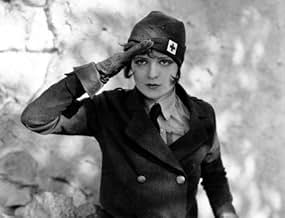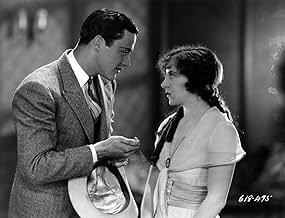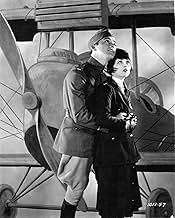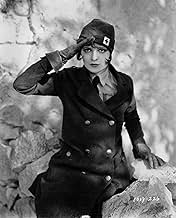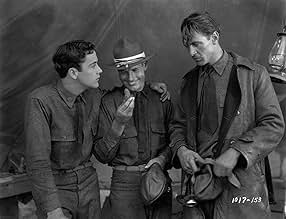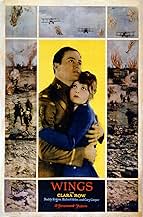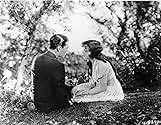NOTE IMDb
7,5/10
16 k
MA NOTE
Deux jeunes hommes, l'un riche, l'autre pauvre, amoureux de la même femme, deviennent pilotes de chasse pendant la Première Guerre mondiale.Deux jeunes hommes, l'un riche, l'autre pauvre, amoureux de la même femme, deviennent pilotes de chasse pendant la Première Guerre mondiale.Deux jeunes hommes, l'un riche, l'autre pauvre, amoureux de la même femme, deviennent pilotes de chasse pendant la Première Guerre mondiale.
- Réalisation
- Scénario
- Casting principal
- Récompensé par 2 Oscars
- 9 victoires et 1 nomination au total
Charles 'Buddy' Rogers
- Jack Powell
- (as Charles Rogers)
Charles Barton
- Soldier Flirting with Mary
- (non crédité)
Thomas Carr
- Aviator
- (non crédité)
Thomas Carrigan
- Undetermined Role
- (non crédité)
Margery Chapin
- Peasant Woman
- (non crédité)
Andy Clark
- Undetermined Role
- (non crédité)
Avis à la une
Wings (1927), is not only the FIRST winner of the Best Picture Academy Award, it may be the BEST film to hold that title, and I say that knowing that Casablanca, Gladiator, and The Last Emperor all hold the statue too. There have been some stinkers dubbed "Best Picture" in the past, (Shakespeare in Love beating Saving Private Ryan??? The Greatest Show on Earth over High Noon?! Spare us all) but this is not one of them.
Even supporters of the film, writing reviews here at IMDb, can't seem to resist taking shots at Wings' plot, but I'm here to tell you it is just fine, even solidly written. Some reviewers don't sound like they have seen this movie in a long time, or if they have, they slept through it. For one thing, the "Love Triangle" is not as convoluted or hard to grasp as others have implied:
Jack Powell (Buddy Rogers) has a crush on one Sylvia Lewis (Jobyna Ralston), the local beauty queen. She finds this cute and indulges it a little bit--actually too much. But she is quite sincerely in love with someone else, David Armstrong (Richard Arlen) a well-off local boy who isn't quite able to figure out how to tell Jack to butt-out because it doesn't involve money. The wild card in all of this (literally and figuratively) is Mary Preston (Clara Bow), who lives next door to Jack and has been mooning over him since she was a little girl.
That's the whole dynamic. I have no idea what someone was thinking when they suggested Mary expressed any feelings for David (She never does). Some have said they can't believe Jack would go for Sylvia with Mary next door. I see their point, because the casting of Clara Bow in her role is like having Kirsten Dunst living next door and not noticing. The problem is, Jack isn't SUPPOSED to notice Mary until the end, when he has experienced the war and realizes that everything he wants is right there at home where he belongs. In the beginning he is all about Fast Cars and the Trophy Girls.
So, the plot thickens as the US gets dragged into World War I and both Jack and David sign up as pilots. Naturally each of them heads to Sylvia's house to say good-bye. Sylvia prepared a locket with her picture in it for David, but Jack sees it first. This scene is a great display of awkwardness wrapped in etiquette, especially when Sylvia tries to let go of Jack's hand. Jack takes the locket from her, and, this being more than she can stand, Sylvia almost gets the words out to tell him the truth when David gets there. At this point Jack turns on the macho-factor, and he is so gleeful about rubbing Sylvia's locket in David's face that he doesn't even notice she never kissed him good-bye.
Sylvia makes up for David's loss of the locket with some tender words and some passionate kissing--no mystery where her feelings lie--and the three of them head off for war. Three, because Mary goes too, as a nurse. Another complaint about this film and it's plot has been that Clara Bow wasn't given enough to do, shunted off into a side part even though she got billing as the Leading Lady, but I just don't see it. Her part was as big as any Romantic Interest in most movies out there; a good example for comparison would be Kathleen Quinlan's roll in Apollo 13. Most of her scenes were not shared with Tom Hanks, but she turned in an emotional and Oscar-nominated performance nonetheless.
The air battles in this film have never been topped anywhere. Ever. And that includes anything involving aliens, fighter jets, or a galaxy far, far, away. The information that the actors flew their own planes is misleading. Actors couldn't do what these pilots do. The stunt flying is by the US Army Air Corps in Texas (!) where the movie was filmed (I dare you to have guessed that on your own). What Rogers and Arlen do is all their own close-ups, flying the plane as they careen and dive. When the camera ran out of film (or the planes ran out of gas) a stunt pilot from the Army would pop up and land the plane.
The resolution of the story I won't comment further on, except to say that it is extremely moving and does highlight the madness of war, especially the kind of war WW1 was. I support military action for just causes, but everything has a cost and Wings lays that cost bare. These were issues being struggled over long before Vietnam, just in case you thought Hippies invented protest.
After complaining that she didn't do enough, some people insist that Mary's tactics in Paris were out of character. No they were not. Mary had to get Jack away from that "other woman" and get him his orders before he got court marshaled. She was not becoming a floozie, only dressing the part, and she paid the ultimate price for the risk she took. It also helped to stir up Jack's feelings about her in later scenes, and get him thinking.
Wings! Melodramatic? Sure. Unoriginal? Well... if you make that claim because you can guess what's coming or you've seen it all before, just ask yourself how old these movies are that you are comparing Wings to, and check Wings' release date again. Maybe the plot-heist occurred in the other direction.
This film deserves a DVD release. Barring that, see if you can track down the old Paramount Laserdisc, LV 2851-2, which is what I had. I have been enamored with, and watching, this film since I was 13 (30 now). It shattered my little-boy prejudices against both black and white and silent films in one great blast of anti-aircraft fire, and I have been spreading its gospel ever since. You will not ever see a better World War 1 film.
Even supporters of the film, writing reviews here at IMDb, can't seem to resist taking shots at Wings' plot, but I'm here to tell you it is just fine, even solidly written. Some reviewers don't sound like they have seen this movie in a long time, or if they have, they slept through it. For one thing, the "Love Triangle" is not as convoluted or hard to grasp as others have implied:
Jack Powell (Buddy Rogers) has a crush on one Sylvia Lewis (Jobyna Ralston), the local beauty queen. She finds this cute and indulges it a little bit--actually too much. But she is quite sincerely in love with someone else, David Armstrong (Richard Arlen) a well-off local boy who isn't quite able to figure out how to tell Jack to butt-out because it doesn't involve money. The wild card in all of this (literally and figuratively) is Mary Preston (Clara Bow), who lives next door to Jack and has been mooning over him since she was a little girl.
That's the whole dynamic. I have no idea what someone was thinking when they suggested Mary expressed any feelings for David (She never does). Some have said they can't believe Jack would go for Sylvia with Mary next door. I see their point, because the casting of Clara Bow in her role is like having Kirsten Dunst living next door and not noticing. The problem is, Jack isn't SUPPOSED to notice Mary until the end, when he has experienced the war and realizes that everything he wants is right there at home where he belongs. In the beginning he is all about Fast Cars and the Trophy Girls.
So, the plot thickens as the US gets dragged into World War I and both Jack and David sign up as pilots. Naturally each of them heads to Sylvia's house to say good-bye. Sylvia prepared a locket with her picture in it for David, but Jack sees it first. This scene is a great display of awkwardness wrapped in etiquette, especially when Sylvia tries to let go of Jack's hand. Jack takes the locket from her, and, this being more than she can stand, Sylvia almost gets the words out to tell him the truth when David gets there. At this point Jack turns on the macho-factor, and he is so gleeful about rubbing Sylvia's locket in David's face that he doesn't even notice she never kissed him good-bye.
Sylvia makes up for David's loss of the locket with some tender words and some passionate kissing--no mystery where her feelings lie--and the three of them head off for war. Three, because Mary goes too, as a nurse. Another complaint about this film and it's plot has been that Clara Bow wasn't given enough to do, shunted off into a side part even though she got billing as the Leading Lady, but I just don't see it. Her part was as big as any Romantic Interest in most movies out there; a good example for comparison would be Kathleen Quinlan's roll in Apollo 13. Most of her scenes were not shared with Tom Hanks, but she turned in an emotional and Oscar-nominated performance nonetheless.
The air battles in this film have never been topped anywhere. Ever. And that includes anything involving aliens, fighter jets, or a galaxy far, far, away. The information that the actors flew their own planes is misleading. Actors couldn't do what these pilots do. The stunt flying is by the US Army Air Corps in Texas (!) where the movie was filmed (I dare you to have guessed that on your own). What Rogers and Arlen do is all their own close-ups, flying the plane as they careen and dive. When the camera ran out of film (or the planes ran out of gas) a stunt pilot from the Army would pop up and land the plane.
The resolution of the story I won't comment further on, except to say that it is extremely moving and does highlight the madness of war, especially the kind of war WW1 was. I support military action for just causes, but everything has a cost and Wings lays that cost bare. These were issues being struggled over long before Vietnam, just in case you thought Hippies invented protest.
After complaining that she didn't do enough, some people insist that Mary's tactics in Paris were out of character. No they were not. Mary had to get Jack away from that "other woman" and get him his orders before he got court marshaled. She was not becoming a floozie, only dressing the part, and she paid the ultimate price for the risk she took. It also helped to stir up Jack's feelings about her in later scenes, and get him thinking.
Wings! Melodramatic? Sure. Unoriginal? Well... if you make that claim because you can guess what's coming or you've seen it all before, just ask yourself how old these movies are that you are comparing Wings to, and check Wings' release date again. Maybe the plot-heist occurred in the other direction.
This film deserves a DVD release. Barring that, see if you can track down the old Paramount Laserdisc, LV 2851-2, which is what I had. I have been enamored with, and watching, this film since I was 13 (30 now). It shattered my little-boy prejudices against both black and white and silent films in one great blast of anti-aircraft fire, and I have been spreading its gospel ever since. You will not ever see a better World War 1 film.
My cousin Clifford M. Blackstone Sr. was the person who filmed the flight scenes in this movie. His son Cliff sent me photographs of his Dad filming this movie as well as a few others with Paramount Studios. Cliff said his Dad was put in an airplane and sent up in the air to crank out all those amazing flight scenes. He said his Dad told him he wasn't even secured in the plane. Cliff Blackstone Sr. is from Mercer County, PA and Cliff Jr. says his Dad was the man who created the zoom lens. Just a side bar, Clara Bow, the lead actress in Wings, had a hairdresser Maryl who Clara introduced to Cliff Sr. Cliff Sr. married Maryl and they had Cliff Jr. It is really a nice story.
For a feeling of what the silents were really like, look for the version of this film with Gaylord Carter performing the score on a Wurlitzer Theater Organ. Carter recorded this version in the 1980's when he was in his 80's. Amazing performance - basically 120 minutes of live, somewhat improvised music with establihed themes for each character. Incidental music was improvised live combining themes from the various characters.
Carter was one of the last musicians that performed during the silent era. Very few musicians understand how difficult this art form was, and Gaylor was one of the best. Each showing of the film was an original, never before heard version due to the improvisational nature of the music. The stamina required to play live music, on 3, 4 or even 5 keyboards with a pedal board and dozens of stops, thousands of pipes for over two hours cannot be overstated. Especially when one of these performers were expected to do so 3 or more times a day!
Orchestras are all well and good, but few theaters could afford them - Wurlitzer (and a few other companies) sold 40,000 instruments to theaters world wide during the 20's, and chances are, 90% of screenings of this film were accompanied by a theater organ.
Carter was one of the last musicians that performed during the silent era. Very few musicians understand how difficult this art form was, and Gaylor was one of the best. Each showing of the film was an original, never before heard version due to the improvisational nature of the music. The stamina required to play live music, on 3, 4 or even 5 keyboards with a pedal board and dozens of stops, thousands of pipes for over two hours cannot be overstated. Especially when one of these performers were expected to do so 3 or more times a day!
Orchestras are all well and good, but few theaters could afford them - Wurlitzer (and a few other companies) sold 40,000 instruments to theaters world wide during the 20's, and chances are, 90% of screenings of this film were accompanied by a theater organ.
David's expressions, when he is saying good-by to his family, are absolutely wrenching. The only one who overacts is Clara Bow, but she's supposed to be the bubbly, irrepressible girl-next-door, so I give her a pass.
(Was the yellow colorization added to flames then or recently? I found it distracting.)
The uniforms are perfectly detailed too, perhaps because the actual war was so recently in people's memories. Modern movie-makers have gotten very careless about uniform details, I think because they assume no one will notice.
Wonderful scene in the Folies Bergere -- note the female couple at one table in the opening clip -- nothing is new under the sun.
Beautifully digitalized restoration,astonishingly crisp. What a national treasure!
(Was the yellow colorization added to flames then or recently? I found it distracting.)
The uniforms are perfectly detailed too, perhaps because the actual war was so recently in people's memories. Modern movie-makers have gotten very careless about uniform details, I think because they assume no one will notice.
Wonderful scene in the Folies Bergere -- note the female couple at one table in the opening clip -- nothing is new under the sun.
Beautifully digitalized restoration,astonishingly crisp. What a national treasure!
This entertaining and occasionally impressive movie is still well worth seeing in spite of its flaws. The combat scenes alone make the rest of it worth watching, and Clara Bow gives a very good performance. She has plenty of energy as always, and here she makes her character especially sympathetic. But it has its weaknesses, too. The story is contrived and full of obvious holes, and except for Bow most of the acting is rather routine (Buddy Rogers is as likable as ever, but no more).
The highlights of "Wings" come in the battle scenes, and they are awfully impressive. Done without computers or other such advantages, they are exciting and are usually completely realistic. The aerial dogfight scenes are especially dazzling. This part of the movie is not shallow stuff, either, since it has a good balance between the thrilling and the horrifying. If the main story-line had been better, this could have worked very well as a classic film about the realities of war and its effects on the young persons who must carry the heaviest load in a war.
But unfortunately, it has the story that it has, which could easily have been better. It is far too heavy-handed, and is also riddled with unlikely coincidences, implausible developments, strange decisions by the characters, and many other such holes. If you can somehow look past all these problems, then it produces some moving and emotional moments, but such moments are too often undone by the contrived ways that they are set up. It's just the kind of mess that has often impressed the individuals who vote for well-known awards, but a movie with such strengths deserved to have a much better plot.
Nevertheless, it is still well worth watching for its strengths, and not just because it is the answer to some trivia questions. Just in case there are any modern movie fans who have accidentally wandered into the silents section of the database, please don't think that this is the best of what silent cinema has to offer, just because it won an arbitrary award. There are many silent film masterpieces that are vastly better than this. But it's good entertainment, and has some portions that were made with great skill.
The highlights of "Wings" come in the battle scenes, and they are awfully impressive. Done without computers or other such advantages, they are exciting and are usually completely realistic. The aerial dogfight scenes are especially dazzling. This part of the movie is not shallow stuff, either, since it has a good balance between the thrilling and the horrifying. If the main story-line had been better, this could have worked very well as a classic film about the realities of war and its effects on the young persons who must carry the heaviest load in a war.
But unfortunately, it has the story that it has, which could easily have been better. It is far too heavy-handed, and is also riddled with unlikely coincidences, implausible developments, strange decisions by the characters, and many other such holes. If you can somehow look past all these problems, then it produces some moving and emotional moments, but such moments are too often undone by the contrived ways that they are set up. It's just the kind of mess that has often impressed the individuals who vote for well-known awards, but a movie with such strengths deserved to have a much better plot.
Nevertheless, it is still well worth watching for its strengths, and not just because it is the answer to some trivia questions. Just in case there are any modern movie fans who have accidentally wandered into the silents section of the database, please don't think that this is the best of what silent cinema has to offer, just because it won an arbitrary award. There are many silent film masterpieces that are vastly better than this. But it's good entertainment, and has some portions that were made with great skill.
Oscars Best Picture Winners, Ranked
Oscars Best Picture Winners, Ranked
See the complete list of Oscars Best Picture winners, ranked by IMDb ratings.
Le saviez-vous
- AnecdotesWas lost for decades until a copy was discovered languishing in the Cinematheque Francaise film archive in Paris, France.
- GaffesThe film is set during the years 1917-1918, but most of the female civilian clothes and hairstyles are contemporary with the late 1920s, particularly the clothes worn by Clara Bow in the home sequences and in the Folies Bergère sequence. Bow and almost all the other female characters have bobbed hair, common in 1927 but almost non-existent during World War One.
- Citations
Sergeant in Mervale: Hey, if youse guys need kissin' *I'll* kiss you - wit' a gun-butt!
- Versions alternativesSome showings have trimmed Clara Bow's brief topless scene.
- ConnexionsEdited into L'aigle et le vautour (1933)
- Bandes originalesThe Star Spangled Banner
(credited on 2012 restored score only)
Written by John Stafford Smith & Francis Scott Key
Meilleurs choix
Connectez-vous pour évaluer et suivre la liste de favoris afin de recevoir des recommandations personnalisées
- How long is Wings?Alimenté par Alexa
Détails
Box-office
- Budget
- 2 000 000 $US (estimé)
- Montant brut mondial
- 1 684 $US
- Durée2 heures 24 minutes
- Couleur
- Mixage
- Rapport de forme
- 1.33 : 1
Contribuer à cette page
Suggérer une modification ou ajouter du contenu manquant







